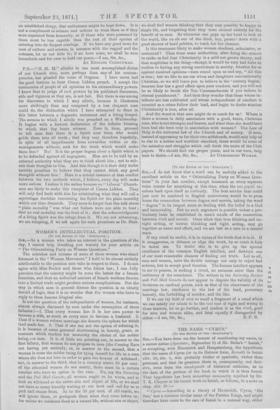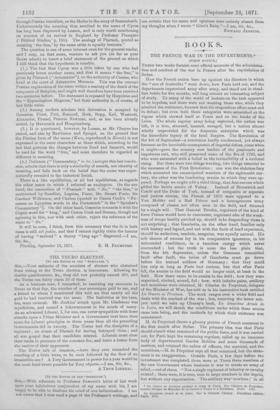THE NAME " CYRUS."
[TO T1111 EDITOR OF TRH "Sricotiloa."]
SIR,—You have done me the honour of mentioning my name, in a recent notice (Spectator, September 9) of Mr. Birks's " Isaiah," as accepting, with Difvernick and Heugstenberg, the hypothesis that the name of Cyrus (or in its Hebrew form, Koresh) in Isaiah xliv. 28, xlv. 1, was probably titular or symbolic, rather than personal, and that its presence there is, consequently, not deci- sive, even from the staitd-punkt of historical criticism, as to the date of the portion of the book in which it is thus found. That hypothesis has been somewhat summarily rejected by Mr. T. K. Cheyne in his recent work on Isaiah, as follows, in a note on chap. xliv. 28 :— " Cyrus.—According to a theory of lliivernick, Cyrus, the Sun,' was a common titular name of the Persian Kings, and might therefore have come to the ears of Isaiah ill a natural way, either
through Persian travellers, or the Medea in the army of Sennacherib. Unfortunately the meaning thus ascribed to the name of Cyrus has long been disproved by Lassen, and is only worth mentioning on account of its revival in England by Professor Plumptre (' Biblical Studies,' p. 195). The analogy of Pharaoh, quoted as meaning the Sun,' by the same critic is equally insecure."
The question is one of some interest even for the general reader, and I may, on that score, venture to ask you (so far as your limits admit) to insert a brief statement of the ground on which I still think that the hypothesis is tenable.
(I.) The fact that Cyrus was a title taken by one who had previously borne another name, and that it means " the Sun," is given by Plutarch ("Artaxerxes"), on the authority of Ctesias, who lived at the court of Artaxerxes Mnemon. `['his was the currant Persian explanation of the name within a century of the death of the conqueror of Babylon, and unght well therefore have been received two centuries before. The statement is repeated by Hesychius and the " Etymologicon Magnum," but their authority is, of course, of but little value.
(2.) Among modern scholars this derivation is accepted by Gesenius, Fiirst, Pott, Burnouf, Reek, Bopp, Keil, Weetoott, Alexander, Pressel, Francis Newman, and, as has been already stated, by Hiivernick and Hengstenberg.
(3.) It is questioned, however, by Lassen, as Mr. Cheyne has stated, and also by Rawlinson and Spiegel, on the ground that the Persian form of the name (Kure, reproduced in Koresh) is not expressed in the same characters as those which, according to the law that governs the changes between Zend and Sanscrit, would be used for the word " Sun," and must therefore be regarded as different in meaning.
(4.) Delitzsch (" Commentary," in loc.) accepts this laat conclu- sion, admits that there is only a similarity of sounds, not identity of meaning, and falls back on the belief that the name was super- naturally revealed to the historical Isaiah, There is a like equilibrium, or all but equilibrium, as regards the other name to which I referred as analogous. On the one hand, the connection of " Pharaoh " with "Bee," "the Sun," is maintained by Rosellini, Lepsius, FiIret, Mr. Stuart Poole, Sir Gardner Wilkinson, and Chabas (quoted in Canon Cook's " Ex- cursus on Egyptian words in the Pentateuch" in the " Speaker's Commentary "). On the other hand, Gesenius connects it with the Coptic word for " king," and Canon Cook and Bunsen, though not agreeing in this, nor with each other, reject the reference of the name to " Ra."
It will be seen, I think, from this summary that the Es in both cases is still sub judice, and that I cannot rightly claim the honour of having "revived" a theory "long ago" disproved.---I am, Sir, &c.,































 Previous page
Previous page